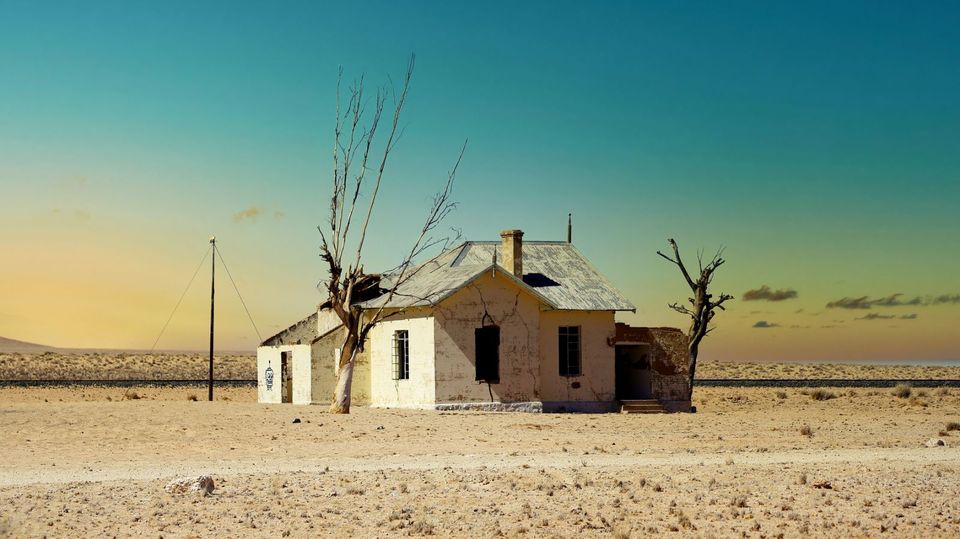What’s the big deal about soil?

The orange glow of the sun, retreating over the horizon, illuminated the old man’s gnarled face. He was sitting on his porch, gazing out at his fields of corn plants as with every small gust of wind, plumes of soil would billow into the air, coating the corn in a thin film of soil. Mr Sullivan would often sit here with his family, talking about the girls' day at school, discussing current events and of course, the next harvest. But today, he was all alone, for his daughters and their families were on a spaceship to Earth 2.
Mr. Sullivan remembered his daughters imploring him to accompany them. He said he did not want to undertake the long journey and be frozen in cryogenic pods. Now a month later, his conviction is shaking.
Mr. Sullivan recalled being with his father on the farm as a young boy, observing their tractor ploughing the soil and earthworms popping out of the ground. He would play with the earthworms, picking them out of the deep brown soil and watching them move. A tear glistened down Mr. Sullivan’s face, the memory of a lifetime ago that only existed in his mind.
Then as he got older, their farm, as well as arable land around the world, had changed. The rich brown soil had turned light brown after decades of soil erosion. The earthworms no longer popped out of the ground due to excessive ploughing. More and more fertiliser and pesticides were needed as there was less organic matter in the soil. Along with this, crop yield was decreasing. His wife urged him to move to the city, but he remained steadfast, taking a loan and buying high-tech machinery and additional fertiliser.
The old man shook his head. In hindsight, he wished he did since his family, and he would have a better life until they inevitably left Earth. Mr Sullivan stood up and gazed over at his fields one more time before retiring to the house.
* * *
The fate of Planet Earth, while exaggerated in this story, may probably become a reality. We have the ability to change the future of Earth, be it bleak or bright.
Physical factors
Soil erosion is one of the most well-known causes of soil degradation, where forces such as water, wind and snow wear away the topsoil, the topmost layer in the soil containing the highest amount of organic matter and microorganisms. Another reason behind soil degradation is when machinery is used to clear land and cultivate crops, methods which again destroy the topsoil.
Biological factors
Organic matter is material formed when plant and animal matter decomposes. Without it, valuable nutrients would be lost, and the water-holding capacity, along with its erosion resistance, will fall. Additionally, animals help with the upkeep of soil by burrowing to make small air spaces or feeding on fungi and animal corpses to turn it into organic matter. However, with excessive ploughing, such as in industrial farming, the organic matter decomposes beyond the optimum level.
Chemical factors
Soil acidification occurs due to acid rain which is caused by acidic gases in the atmosphere, such as sulfur dioxide that is released from burning coal, acidic fertilisers and mining runoff. It decreases the amount of nutrients and provides an unsuitable environment for soil organisms that, as mentioned earlier, provide organic matter to the soil. Toxic compounds in the soil, such as mercury, arsenic and lead, contribute to soil degradation, which affects the plants negatively and also causes disastrous side effects for humans.
Reversing soil degradation
Soils are the lifeblood of society since everything we use is somewhat connected to the soil. The noodles I ate yesterday were made from rice grown in soil, and the wooden table I am keeping my laptop on to type this is from a tree grown in soil. For this reason, taking care of soil is essential. There are many ways to do so, from farming responsibly so farmers do not grow one type of crop and implement organic farming to conserving land by planting trees and establishing nature parks and preventing pollution by stopping agricultural and industrial pollution.
What does all of this mean?
Our Earth is an interconnected web of connections, with everything in a fragile balance. With the rise of the Industrial Revolution, our planet has been put out of balance by global warming. One of these effects is soil degradation, but it is not the only one. Extreme weather patterns, melting glaciers, rising sea levels and disease outbreaks are just some effects of this imbalance. To protect our soils, we need to address the entirety of global warming, calling upon governments and large institutions to make and stick to their climate goals as changing your personal lifestyle does not make a significant impact.
References
Soil degradation, in general
Advances in Soil Science. (2023). Google Books. https://books.google.mv/books?hl=en&lr=&id=KL7kBwAAQBAJ&oi=fnd&pg=PR13&dq=factors+that+cause+soil+degradation&ots=H8LNLEHGZQ&sig=UEhwnb_MKTag0G7bkIbyXWtcDTs&redir_esc=y#v=onepage&q=factors%20that%20cause%20soil%20degradation&f=false
Soil erosion
What is Soil Erosion? (2023). Google Books. https://books.google.mv/books?hl=en&lr=&id=KQ4zAAAAIAAJ&oi=fnd&pg=PA1&dq=what+is+soil+erosion&ots=IsTb2ed_p5&sig=k0L-kpzDuf59lS_IMMf4V9N7-64&redir_esc=y#v=onepage&q=what%20is%20soil%20erosion&f=false
Compaction
Kayombo, B., & Lal, R. (1993). Tillage systems and soil compaction in Africa. Soil and Tillage Research, 27(1-4), 35–72. https://doi.org/10.1016/0167-1987(93)90061-s
Acidification
Goulding, K. W. T. (2016). Soil acidification and the importance of liming agricultural soils with particular reference to the United Kingdom. Soil Use and Management, 32(3), 390–399. https://doi.org/10.1111/sum.12270
Soil acidity. (2019). Agriculture Victoria. https://agriculture.vic.gov.au/farm-management/soil/soil-acidity#:~:text=Acidity%20has%20the%20following%20effects,leached%20below%20the%20rooting%20zone.
Toxic compounds
Prakash Bansal, O. (2019). The Influence of Potentially Toxic Elements on Soil Biological and Chemical Properties. Metals in Soil - Contamination and Remediation. https://doi.org/10.5772/intechopen.81348
Humus
Humus. (2022). Nationalgeographic.org. https://education.nationalgeographic.org/resource/humus/#:~:text=Encyclopedic%20Entry%20Vocabulary-,Humus%20is%20dark%2C%20organic%20material%20that%20forms%20in%20soil%20when,remains%20add%20to%20the%20litter.
Biological factors
Funderburg, E. (2021). What Does Organic Matter Do In Soil? Noble Research Institute; https://www.noble.org/news/publications/ag-news-and-views/2001/august/what-does-organic-matter-do-in-soil/
One second of emission
Can, W. (2023). Sources What Can You do To Stop Climate Change? And Should You? Sources. Google.com. https://sites.google.com/view/sources-climate-how/
Image
Photo by Simon Hurry on Unsplash
Author Biography
Born in 2008, Tazkia Hoodh Jayatileke is passionate and proficient in STEM. Gourmandises books and sushi with the same vigour. From a young age, she has had an interest in video games. Is PADI Open Water certified and enjoys jet skiing and go-karting.

Cite this article as:
Tazkia Hoodh Jayatileke, What's the big deal about soil?, theCircle Composition, Volume 4, (2023).
